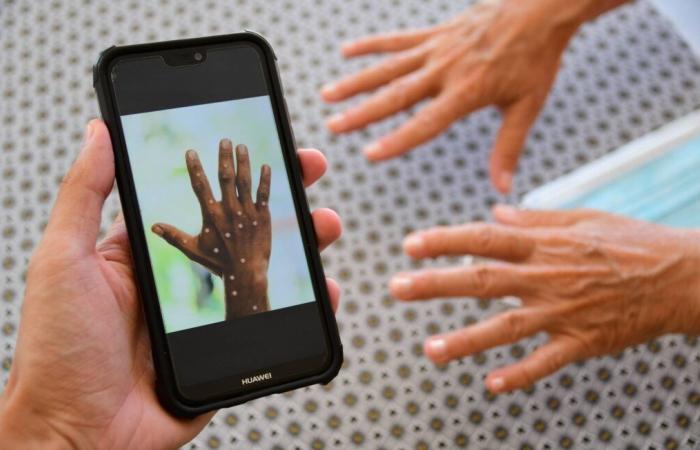“There is nothing to worry about.” The day after the announcement of the detection of the first case of the new Mpox variant in France, Yannick Neuder, the new Minister of Health, wanted to be reassuring this Tuesday. He was traveling to Rennes, the city where the patient infected with the virus is hospitalized.
Placed in isolation, the patient has “no symptoms or serious condition”, he indicated, also assuring that no other “sporadic cases” had been recorded in the territory. 20 Minutes takes stock of this new variant of the virus which is starting to spread in Europe.
What is Mpox?
Mpox virus, also known as monkeypox, is an infectious disease first identified in humans in 1970 in the Democratic Republic of Congo. Circulating among wild animals, this zoonosis can be transmitted to humans and is also transmitted between people.
Endemic in Central and West African countries, Mpox began to spread in 2022 to the rest of the world, particularly in Europe, where the virus had never circulated. It was its clade 2 variant which was responsible for the global epidemic that year. According to Public Health France, it has been circulating since then “at low noise in France with 215 cases declared”, and “on average three cases declared per week at the end of the year”.
What is this new clade 1 b variant?
This new variant of Mpox is considered more contagious and more dangerous. It has been the cause of growing epidemics in Africa for several months, mainly in the Democratic Republic of Congo and its neighboring countries, with “a total of cases in 2024 already higher than that of 2023”.
On August 15, 2024, a first case of Mpox clade 1 was detected in Sweden, then in Germany on October 22, in the United Kingdom on October 30 and in Belgium on December 18.
Who is the first case identified in France?
This is a woman living in Brittany, whose age has not been specified. Treated at the Pontchaillou University Hospital in Rennes, the patient did not travel to Central Africa but “was in contact with two people returning from Central Africa”, specifies Yannick Neuder, the Minister of Health, adding that she does not had so far “no symptoms or serious condition”.
The woman was placed in solitary confinement with barrier gestures put in place for the nursing staff. “Investigations are underway to find the origin of the contamination and identify all the contact persons at risk around the diagnosed case,” specifies the Ministry of Health.
What is the reaction of the authorities?
“This naturally leads to vigilance and caution but there is no need to worry,” Yannick Neuder reacted this Tuesday during his trip to Rennes. According to the Minister of Health, “things are under control since there is international monitoring with the World Health Organization and the European study center”. Finally, he recalls that Mpox is “a disease which is self-limiting and which heals itself”. It is characterized in particular by a rash on the palms of the hands and feet and may be accompanied by fever. Most often benign, it can however “pose some problems if the patients are fragile”.
Who are the populations at risk?
After the discovery of the first case of this new variant in France, health authorities reiterate the importance of being vaccinated for target audiences. Particularly concerned are “people with close links to the countries of Central Africa where the Mpox virus is actively circulating, including people regularly visiting their families or humanitarian workers”.
The latest information on Mpox
As the disease can be transmitted during sexual intercourse, Public Health France also targets among people at high risk of exposure “men who have sex with men who have multiple partners and trans people who have multiple partners”, ” sex workers”, “people in situations of prostitution” and “professionals in places of sexual consumption”.






